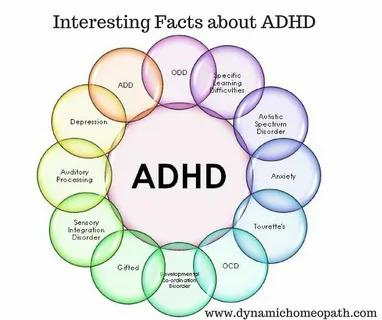Title: The Science Behind ADHD and Anxiety: Exploring Neurological Connections
Anxiety disorders and attention-deficit/hyperactivity disorder (ADHD) are two common mental health illnesses that frequently combine and can have a major influence on a person’s everyday functioning and quality of life. Despite being separate conditions with their own symptomatology, research indicates that anxiety and ADHD may share underlying brain similarities. Examining the brain areas, neurotransmitter systems, and neurobiological processes connected to both disorders, this essay investigates the scientific evidence supporting the neurological linkages between anxiety and ADHD.
Knowing About Anxiety and ADHD
It’s important to comprehend the nature of anxiety and ADHD before exploring the brain connections between these disorders:
Hyperactivity, impulsivity, and focus problems are hallmarks of ADHD.Extreme concern, fear, or apprehension are hallmarks of a variety of ailments together referred to as anxiety disorders.Despite being separate disorders, anxiety and ADHD frequently overlap, with people exhibiting symptoms of both at the same time.
Brain Areas Associated with Anxiety and ADHD
Studies using neuroimaging have shed light on the brain areas linked to anxiety and ADHD:
Prefrontal Cortex (PFC):
Working memory, impulse control, and attention are among the executive activities that the prefrontal cortex, and more specifically the dorsolateral prefrontal cortex (DLPFC), is engaged in. PFC dysfunction has been linked to attention regulation and emotional processing abnormalities in both anxiety and ADHD.
Amygdala:
The amygdala is a brain region that is essential for processing emotions and controlling fear and anxiety reactions. Anxiety disorders have been connected to amygdala dysfunction, with elevated activity in this region being linked to an increase in anxiety symptoms.
Anterior Cingulate Cortex (ACC):
This area of the brain is responsible for emotion regulation, error detection, and cognitive control. Anxiety and ADHD have been linked to dysfunction in the ACC, which exacerbates issues with attentional control and emotional regulation.
Contextual processing and memory consolidation are two functions of the hippocampus. Both ADHD and anxiety disorders have been linked to hippocampal dysfunction, which is especially evident in relation to memory problems and changes in fear conditioning.
Systems of Neurotransmitters
Numerous neurotransmitter systems have been linked to the pathogenesis of anxiety and ADHD:
Dopamine:
This neurotransmitter plays a role in motivation, reward processing, and executive processes. ADHD has been linked to dysfunction in the dopamine system, namely in the mesocorticolimbic pathway, which contributes to attention and impulse control problems. Furthermore, dysregulation in dopamine neurotransmission has been linked to increased arousal and attentional bias towards threat stimuli, and changes in dopamine signalling have also been linked to anxiety disorders.
Noradrenaline:
Also known as norepinephrine, noradrenaline has a role in the control of stress, arousal, and attention. Both anxiety and ADHD have been linked to dysregulation in the noradrenergic system; changes in noradrenaline levels are responsible for symptoms like heightened alertness, impulsivity, and hyperactivity in anxiety disorders and increased vigilance and bodily arousal in ADHD.
Serotonin:
Serotonin has a role in the control of anxiety, emotion, and mood. Anxiety disorders have been linked to serotonergic system dysfunction, with changes in serotonin neurotransmission playing a role in exacerbating anxiety symptoms. While serotonin dysregulation is more frequently linked to anxiety disorders, some evidence indicates that changes in serotonin signaling may also be involved in ADHD, especially when it comes to impulsivity and mood regulation.
Mechanisms of Neurobiology
The neural links between anxiety and ADHD have been linked to a number of different neurobiological pathways, including:
Executive Dysfunction:
Anxiety and ADHD have been linked to impairments in the prefrontal cortex and related executive processes, including impulse control, affective management, and attention regulation. Distractibility, impulsivity, and trouble controlling emotions are examples of overlapping symptoms that may be caused by deficits in executive functioning.
Hyperarousal and Modified Stress Response:
Anxiety and ADHD are linked to dysregulation in the noradrenergic and hypothalamic-pituitary-adrenal (HPA) axis. Increased alertness to threat cues, hyperactivity, and impulsivity in ADHD, as well as heightened physiological arousal and exaggerated stress reactions in anxiety disorders, may be caused by altered stress responses and heightened arousal.
Fear Conditioning and Emotional Processing:
Anxiety and ADHD have been linked to dysfunction in the brain areas responsible for fear conditioning and emotional processing, such as the anterior cingulate cortex and amygdala. Emotional dysregulation, hypervigilance, and avoidance behavior are symptoms that may be related to both illnesses due to altered emotional processing and heightened fear reactions.
Environmental and Genetic Factors
Anxiety and ADHD can arise as a result of both environmental and genetic factors:
Genetic Factors
Heritability estimates for both anxiety disorders and ADHD range from 30% to 60%. Twin and family studies have shown a considerable genetic component to both conditions. For certain people, the co-occurrence of anxiety and ADHD may be influenced by shared genetic variables.
Environmental Factors:
Stress in early life, trauma, and traumatic experiences during childhood have all been linked to the development of anxiety and ADHD. Genetic predispositions combined with long-term stressors and unfavorable environmental factors may raise the likelihood of developing anxiety and ADHD.
In summary
In summary, there are numerous and intricate neurological links between anxiety and ADHD, including abnormalities in different brain regions, neurotransmitter systems, and neurobiological processes connected to both disorders. Knowing the basic neurobiology of anxiety and ADHD can help in understanding their commonalities, co-occurring conditions, and potential treatment options. For people with co-occurring ADHD and anxiety, greater research into the neural pathways linking the two conditions will be necessary to create tailored treatment plans and more effective interventions.
